Amidst the quiet buzz of activity at Suva Health Clinic, a baby’s cry punches through, signalling the completion of a series of vaccines administered to 2-month-old Josaia. His mum, Sainimili, quickly soothes Josaia by kissing and hugging him a little more tightly. Josaia’s cry quickly settles, and another young life is protected through vaccination.
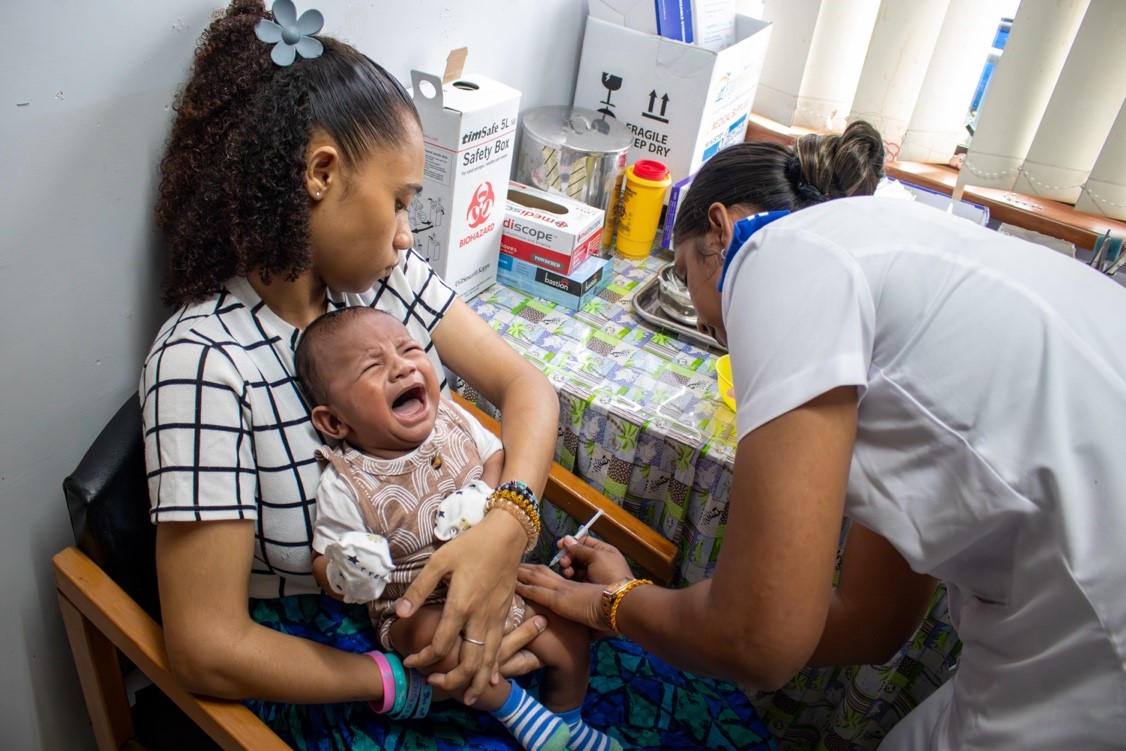
Nurse Shivanjali Sobha administers a vaccine to 2-month-old Josaia to prevent pneumococcal disease, while Josaia is held by his mother, Sainimili, throughout the process. Photo: WHO/Faizza Tanggol
Sainimili, Josaia’s mother, exemplifies the commitment of parents and caregivers across Fiji who actively take part in the National Programme on Immunization, a collective effort led by the Ministry of Health and Medical Services to protect Fijians from life-threatening diseases.
Throughout the years, Fiji has maintained high immunization coverage. Looking at the vaccination rate for measles, Fiji achieved 100% coverage for the first dose and 84% for the second dose in 2022. Countries worldwide are encouraged to reach at least 95% immunization coverage with both doses to provide necessary protection against this serious and sometimes life-threatening infection. In the best-case scenario, measles causes a rash and fever, but it can also cause more serious complications including blindness, pneumonia, diarrhoea, brain damage and death. The measles vaccine, which was introduced in 1963, provides life-long protection.
Sister Litiana Volavola, Programme Manager for Immunization at the Fiji Ministry of Health and Medical Services, reflects on the importance of achieving the 95% immunization target, as we sit with her in the Suva Health Clinic. She explains, “We need to achieve 95% [coverage], so we create that herd immunity [to protect] those who’ve been vaccinated and some of those who are still not vaccinated.”
The idea is, if enough children are vaccinated, the measles virus will not be able to find enough unvaccinated children to enable it to spread. The virus can then be effectively eliminated, keeping every child in Fiji safe.
“Immunization is one of the best tools we have to safeguard communities from preventable diseases – every year, vaccines save millions of lives around the world,” said Dr Jun Gao, acting WHO Representative to the South Pacific. “Between 2020 and 2018, 23 million deaths were prevented from measles alone. That’s why it is critical that we work together to ensure that people across Fiji receive this life-saving protection.”
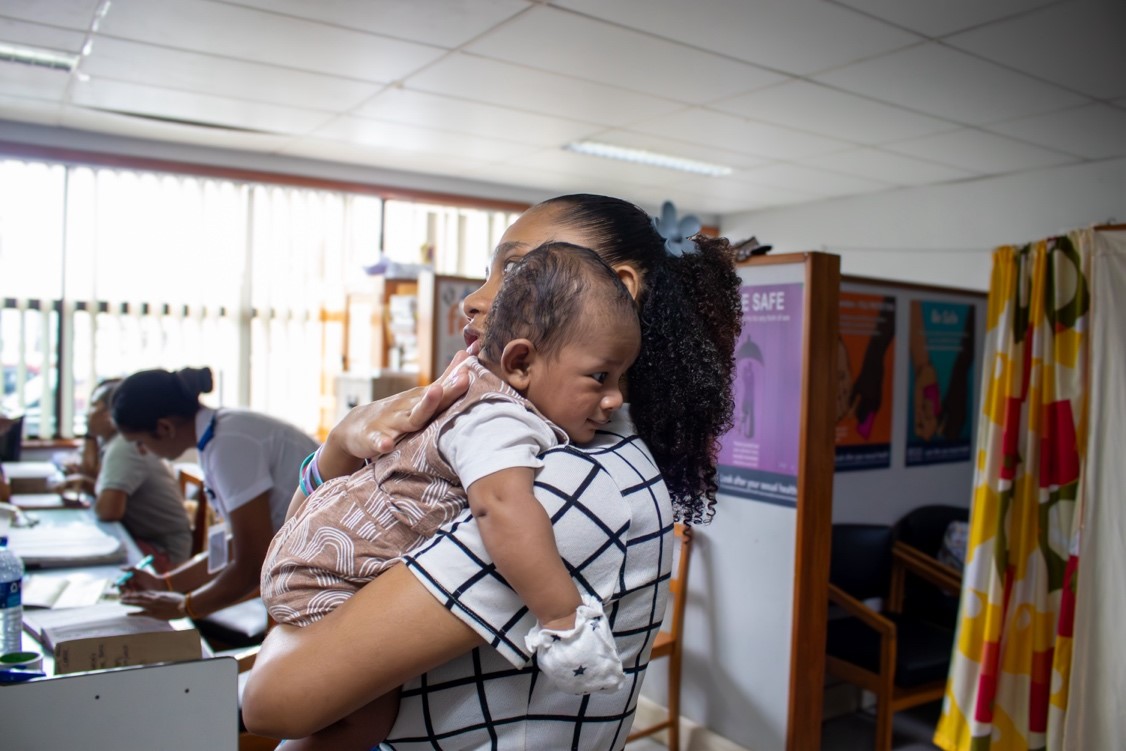
Mum Sainimili soothes her 2-month-old baby Josaia after his vaccinations at the Suva Health Clinic. Photo: WHO/Faizza Tanggol
What it takes to reach every child
It takes a lot of work to ensure that every child in Fiji is vaccinated. Ranjila Devi, the World Health Organization’s (WHO) Immunization Support Officer for the Western Division works closely with the Ministry. She sheds light on the meticulous preparations:
“There is a lot of planning involved in this programme. We plan out training, we go out doing supervisory visits, monitoring the cold chain, and strengthening our immunization programmes,” Ranjila describes.
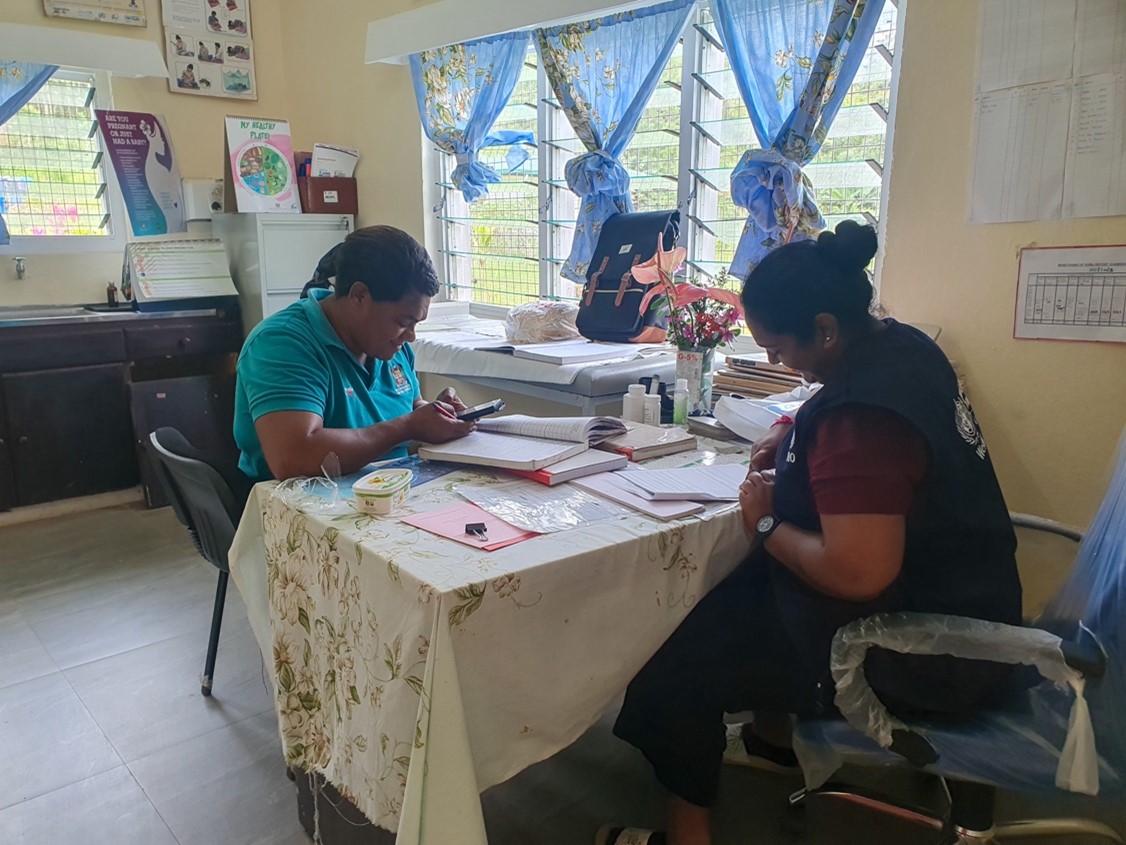
WHO’s Ranjila Devi (right) with staff nurse Alesi during a supportive supervision visit at Nasau Health Centre in Rakiraki, Fiji. Photo: WHO/Misbah Harun
WHO, through its office in Suva, collaborates closely with the Ministry of Health and Medical Services on public health priorities including immunization. Final decisions always rest with the Ministry, but WHO supplies international immunization experts who provide guidance and share experiences from other countries. WHO also engages local experts who help with assessing programme effectiveness, finding solutions to challenges, and ensuring timely data submission for informed decision-making.
Currently, this support is provided by Ranjila for the Western Division and Petueli Tui, WHO’s Immunization Support Officer covering all of Fiji. Working with Sister Litiana and colleagues within the Ministry of Health and Medical Services, Ranjila and Petueli contribute to the close coordination and full implementation of immunization initiatives.
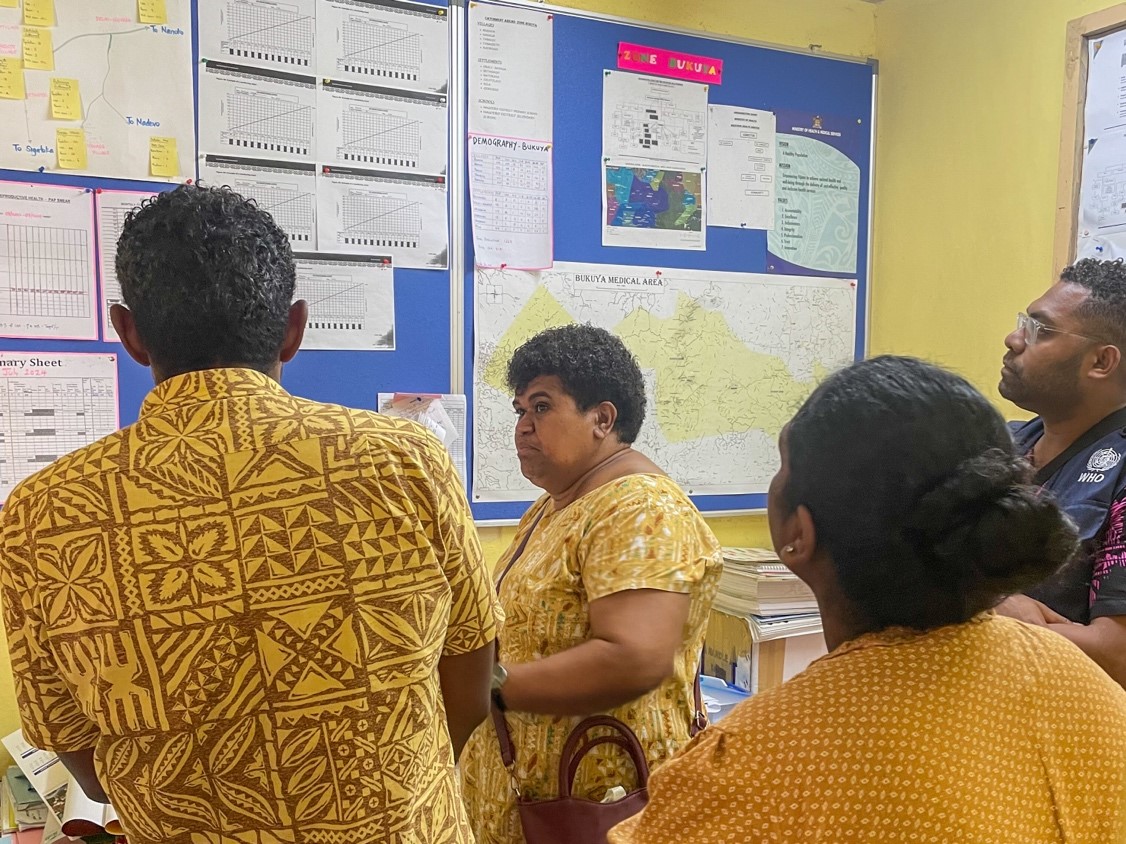
Sister Litiana Volavola (centre) with Petueli Tui (right) and Ranjila Devi (second from right) during a visit at Bukuya Health Centre in the town of Ba, Fiji. Photo: WHO/Md Shafiqul Hossain
Sister Litiana expresses the value of this collaboration: “Managing the programme is not easy. I’d like to thank WHO for their wisdom in bringing in experts to handle the division. They’ve come with their expertise, and we rely on that to get things done. They’ve been wonderful on the job.”
The Ministry and WHO also work closely with UNICEF who, among other things, provides support for the procurement of vaccines and the “cold chain” – the system of refrigerated transport, cooler boxes and fridges required to keep vaccines at the required temperature as they travel from the manufacturer to clinics and nursing stations all over Fiji. The three partners work together to ensure the right vaccines, in the right quantities, reach children at the right time. They also work together to communicate with the public on the importance of vaccination and to listen to and answer community questions and concerns. This team effort, as well as the efforts of healthcare workers, parents, and caregivers across the country, is pivotal in achieving sustained success. International knowledge combines with local expertise for an effective and well-informed immunization programme.
Evolving immunization landscape in Fiji
Now that COVID-19 is here to stay, Fiji is actively integrating COVID-19 vaccines into routine immunization services. COVID-19 vaccines will continue to be available in key locations: Suva Health Clinic for the Central Division, Nadi Sarda Clinic for the Western Division and Labasa Maternal and Child Health Clinic for the Northern Division. By visiting these health centres, Fijians can access the protection of COVID-19 vaccines, particularly people at most risk of severe illness, such as those aged over 60 or with certain underlying health conditions like high blood pressure, diabetes, or obesity.
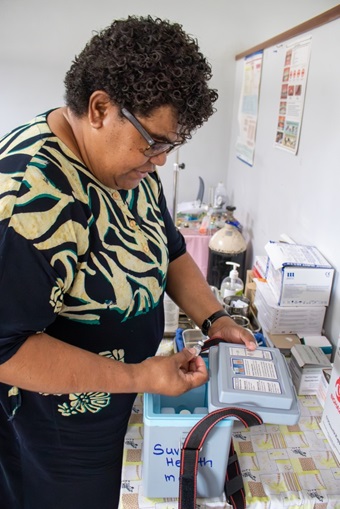
Sister Litiana Volavola shows the paediatric COVID-19 vaccines available at the Suva Health Clinic for children aged 5-11 years. Photo: WHO/Faizza Tanggol
Fiji’s immunization strategy is constantly evolving with the introduction of new vaccines and revision of policies. The Ministry of Health and Medical Services is currently gearing up for the future expansion of the polio vaccination schedule and the introduction of the HPV vaccine to protect women from cervical cancer.
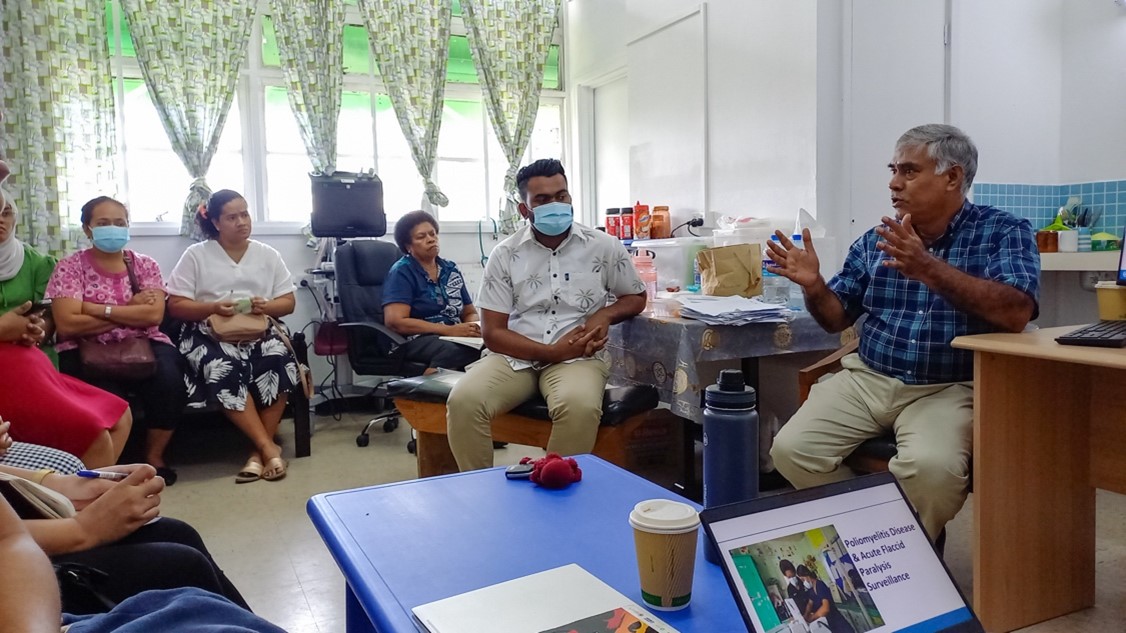
Dr Md Shafiqul Hossain (right), Technical Officer for Vaccine-Preventable Diseases and Immunization at WHO’s South Pacific office, speaks during a hands-on training conducted by WHO and Ministry of Health on polio and acute flaccid paralysis surveillance, to help strengthen polio eradication efforts in Fiji. Photo: WHO/Petueli Tui
Sister Litiana’s message to parents who bring their children in for routine immunization is heartfelt: “I really want to thank them if they have been bringing their children all this while, knowing the benefit and the value of the vaccines against the risks and the cost.” As for parents and caregivers whose children may have missed childhood vaccines, she urges them to come to health facilities for vaccination, emphasizing accessibility even if they have lost their vaccination card or their child has passed the recommended age.
As for those who still need the protection of COVID-19 vaccines: “We have supplies for them,” Sister Litiana says. “Anybody that's still not vaccinated can come forward.”
As Fiji navigates the complex landscape of immunization, the Ministry of Health, WHO and UNICEF remain steadfast in their dedication to protect the health of every Fijian.
--------------------
WHO’s support for immunization in Fiji is funded by the governments of Australia, Japan, and the United States of America. We would like to thank our partners for their financial contributions.
